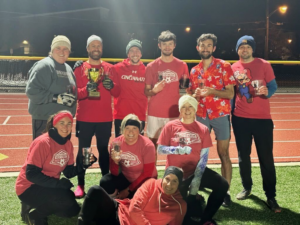
My neighbors joke that my real job must be walking dogs. After all, they see me walk by their houses 3 or 4 times each day with dogs leashed in front of me. In many ways, they are right. After all, you’ll hear developers talk about using the right tool for the job. When you’re stuck on a complex problem, a walk can be the right tool.
We’ve all had the experience where you are sitting at your desk struggling with a problem. You work on something for hours at the end of the day, only to return the next morning to realize you missed a simple solution. When I was younger, I would try to power through until I had a solution. Now, I use a different tactic. I give up. I do something else.
If you’re shaking your head wondering how I can suggest just giving up on complicated tasks, don’t worry, I don’t mean forever. Even when I give up on a task, it’s not like my brain stops working on it. More often than not, the answer just comes to me when I’m out walking, in the shower, or just generally letting my mind wander. This is advice you hear a lot in the startup world, although maybe not quite in this form. When our current product idea isn’t working, we stop, take stock of where we’re at, and pivot. So why should our day-to-day be any different? If what you are doing isn’t working, do something else.
I find several benefits to this approach. First, it limits burnout. My leading cause of burnout is not being able to make progress. When I bang my head against the wall trying to get something done, I get increasingly frustrated. When I’m frustrated, I am less likely to find creative solutions to my problems. By turning my attention elsewhere, I give my brain space to settle down and get back to a space of creativity.
At the same time, moving from an unproductive task to a productive task means that I’m making progress on something. Even if what I choose to work on isn’t as important as my original task, at least it’s getting done! The net value created is much higher in this situation. If that’s not possible, sometimes it makes sense just to call it a day. I’ve had employees come to me because they can’t get anything done and are getting frustrated. When that happens, it’s better to leave early.
Finally, by changing my perspective, either literally or figuratively, I give myself space to make more significant jumps in logic. When I’m focused intently on a problem, I’m likely only seeing it from one angle. When I move my thinking to the subconscious, I allow my brain to consider information outside of my original area of focus. The end result is that I tend to come up with simpler, more creative solutions.
So the next time you’re stuck on something, don’t fight through. Give up, and give your brain some space to be creative.





